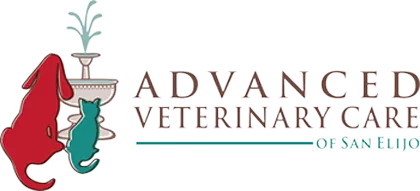July 4th is quickly approaching and at Advanced Veterinary Care (AVC) we want you and your pet to enjoy the holiday. At AVC our primary mission is to help pets in our community live long, happy, healthy lives, and accident prevention is a big part of this.
For humans, July 4th is a fun holiday full of barbeques, trips to the beach, pool parties, and fireworks. For pets however, this holiday can be both scary and dangerous. Some of our favorite July 4th activities can be harmful or even fatal. Here are some tips to help keep your pet safe this July 4th.
Holiday Parties: Remember that pets have delicate digestive systems and changes to their diet could cause vomiting, diarrhea, or even a more serious condition called pancreatitis. A burger or hot dog that falls on the ground may seem like a nice treat
for your dog, but you are better off throwing it away. Chicken, steak, and rib bones are choking hazards and may cause internal bleeding if swallowed and digested. Even fruits and vegetables can present potential problems as some some produce such as grapes, onion, and certain avocados are toxic to dogs. Also, remember that alcohol is toxic to
pets. Additionally, new people and in the home and the "party atmosphere" can be very stressful to pets. It can lead to fear, hiding, and even fear-driven aggression/biting.
If possible, it is advisable to contain your pet in an area away from the party. If your pet mingles with the guests, make sure they do not indulge in any untended plates or drinks, and watch your pet carefully for signs of emotional stress. If
you have reason to believe your pet may have ingested something harmful, contact your local emergency vet immediately.
Water Hazards: Beach visits and pool parties are a San Diego staple, and a common way to celebrate 4th of July. While many dogs love the water and are excellent swimmers, this is not true for all dogs. A doggy life-vest can help keep your dog afloat if they choose to go in to deeper waters. If using a life vest, make sure to remove it when your dog is not in the water, as it can lead to over-heating. When at the beach, make sure that the surf is not too large and that you are not in an area with riptides. Bring fresh water and do not let your dog drink the salt water, as it can dehydrate them or even lead to "salt water toxicity," which is a medical emergency. When at a pool, keep an eye on your dog at all times, make sure your dog knows where to get out of the pool, and do not let them get over-tired while swimming. Again, always provide fresh water, as pool water can also make a pet sick. Lastly, never throw or push a pet into the pool or water. This can be extremely traumatic for the animal and cause a lifelong fear of water.
Fireworks: Possibly the most traumatic event for pets on the Fourth of July is fireworks. It is reported that more pets go missing on the July 4th than any other day of the year, and the 5th of July sees the greatest increase of lost pets in to shelters. This increase is largely due to panic from fireworks displays.
Fireworks can be so upsetting for some dogs that they jump over high fences or even through windows out
of sheer panic or in an attempt to escape the noise and booming vibration. Some of the most important things you can do to protect your pets (even indoor pets) is to make sure
they are microchipped, the microchip information is updated, and they have a collar with your contact information on it. We strongly recommend your pet have both a microchip and a collar with ID. July 1 is National ID Your Pet Day, which serves as an
annual reminder to make sure your pets’ identification tags and microchip information are current.
Other things you can do to help your pet survive the holiday include, keeping them
home and indoors, closing all the windows and doors, keeping your pet in a room with no or few windows (windows vibrate during fireworks), leaving a television or radio playing to drown out noise, keeping them in a small secure space, and staying home with your pet. For dogs with
an extreme fear of fireworks, calming products and/or anti-anxiety/sedative medications may be necessary (in addition to everything mentioned above). Calming product include supplements, Thundershirts, and calming pheromones such as Adaptil. For more information on anti-anxiety medication, give us a call!
If you have any questions regarding how to keep your pet safe this Fourth of July, or any other day, please do not hesitate to contact us. Remember that at AVC, our first line of defense is always prevention.

